Pregnancy Test in Pune : Book Appointment with Pathofast Lab
Lab tests are necessary for diagnosis of pregnancy and monitoring of the mother's and baby's health. Pathofast Lab offers blood tests and urine tests for the pregnancy detection and monitoring, including Antenatal tests.
Table of Contents
- What is Pregnancy - What are the different pregnancy tests?
- Lab tests to know if you are pregnant
- Tests to be done in first three months of pregnancy(first trimester / week 1 - 12)
- Tests to be done between 3rd and 6th month of pregnancy (Second Trimester / Week 12 - 24)
- Third trimester tests in pregnancy(Month 6 - month 9 / Week 24 onwards)
- Tests for diabetes in pregnancy - Gestational Diabetes Mellitus
- TORCH Test - Tests for Infections in Pregnancy
- Thalessemia Screening in Pregnancy - Hemoglobin Electrophoresis Test
- NIPT - Non invasive pregnancy test : What is it and why is it important?
- Testing for Dangerous Complications in Pregnancy
- Preparing for Blood Tests in Pregnancy
- Finding a lab near you for Pregnancy Tests in Pune?
- Further Reading
What is Pregnancy - What are the different pregnancy tests?
Pregnancy is when a mother has conceived together with her male partner.A Pregnancy test refers to a blood test called Beta HCG. Other Tests are also necessary in the different months of pregnancy to monitor various infections in the mother, diabetes and genetic abnormalities in the baby.
Tests to diagnose pregnancy
This includes tests like Beta-HCG - a blood test to detect pregnancy and Ultrasound (USG) for confirmation.Tests for Mother's Well Being
Pregnant women should be tested every 3 months, for their general well being. This is called the Antenatal Profile or Antenatal Checkup and includes tests like CBC, Urine Routine, HIV, Hepatitis B, Syphilis, Blood Group Test, Vitamin B12 Test, Folate Test, Iron Test, Random Sugar Test.
These tests ensure that the mother has adequate Hemoglobin, Iron stores, and vitamin levels and is not carrying any STD Infections. These tests are important as they have a direct bearing on the health of the developing child.
Tests for Genetic Abnormalities in the baby
These tests are usually done at 11-13 weeks and again around 20 weeks. They are blood tests done on the mother to screen the developing child for abnormalities like Trisomy 18, 21, and 13. Down's syndrome screening is the main purpose of these tests. They include Double Marker, Triple Marker and Quadruple Marker testsTests to screen for infections
Some infections like Toxoplasmosis, Rubella and Herpes can be passed from mother to baby. Specific test profiles like the TORCH Test screen for these infections.Tests for Diabetes in Pregnancy
These tests screen the mother for developing GDM(Gestational Diabetes Mellitus). They are important to make sure that the developing baby is not subjected to high sugar levels. The pregnancy glucose tolerance test is indicated for this purpose.Table of Important Lab Tests in Pregnancy
| Time/Month of Pregnancy | Name of the Test | Purpose |
|---|---|---|
| 2 weeks to 6 weeks | Beta HCG Blood Test for Pregnancy | Detect Pregnancy |
| First Trimester (11-13 weeks) | Double Marker, TORCH Test | Detect Down's Syndrome in Baby, Check for infections in mother |
| Second Trimester (15-20 weeks) | Triple Marker and Quadruple Marker tests, TORCH Test | Detect Genetic Abnormalities in Baby, Check for infections in mother |
| Third Trimester (>24 weeks) | pregnancy glucose tolerance test | Screens for Diabetes in Pregnancy |
| Optional Tests / Rare Tests | APLA Antibodies, Hemoglobin Electrophoresis Test | Screens for APS Syndrome in susceptible mothers |
| Every 3 months | Antenatal Profile(ANC Test) | Screens for STD's, nutritional deficiencies and general infections in the mother |
Lab tests to know if you are pregnant
A blood test called Beta-HCG Test can help to detect pregnancy. It detects the level of Beta-Human Chorionic Gonadoptrophin - a hormone released from teh placenta (connection between mother and baby). The levels of Beta-HCG double every 24 hours in the first 3 months of pregnancy. The blood test does not give a result of positive/negative, rather it will provide a value of the Beta-HCG level and this has to be compared to expected values, based on the week of gestation. The BETA-Hcg test can detect pregnancy as early as 10 days, but it must be repeated at least once for confirmation.
A urine pregnancy test can also be done to detect HCG, as it is released into the urine. Urine tests are not recommended for pregnancy diagnosis, as they have a lower accuracy than blood tests. For instance, if a urine test is done after the patient drinks a large amount of water, the test may be false negative. We do not perform the urine pregnancy test at our lab for these reasons.
Ultrasound (USG) can visualize the pregnancy around 4-5 weeks. This is the earliest date at which visual proof of the pregnancy can be estimated.
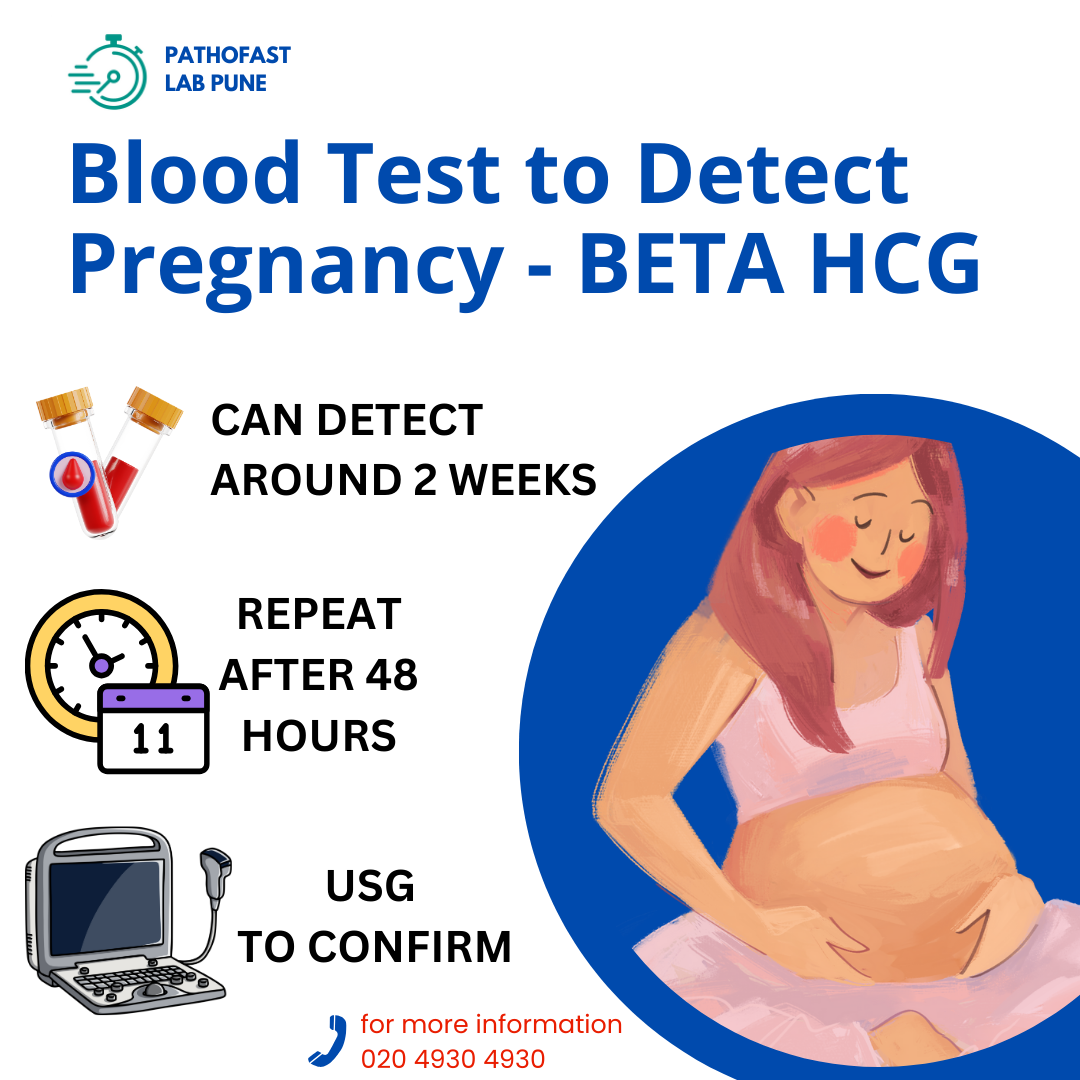
Which test can diagnose pregnancy earliest?
| Week of Gestation | Name of Test that Can Diagnose Pregnancy |
|---|---|
| 2 Weeks and more | Beta-HCG Blood Test |
| 4 weeks or more | USG (Transvaginal Ultrasound) |
| 7-8 Weeks | USG (Abdominal Ultrasounbd) |
Which tests should be done once pregnancy is diagnosed?
On diagnosis of pregnancy, an Antenatal Profile (ANC) test should be done - it is a simple blood test and described below.Tests to be done in first three months of pregnancy(first trimester / week 1 - 12)
The first trimester refers to the first 3 months of pregnancy. These tests are aimed at finding preventable infections in the mother, and checking for early genetic abnormalities in the fetus.
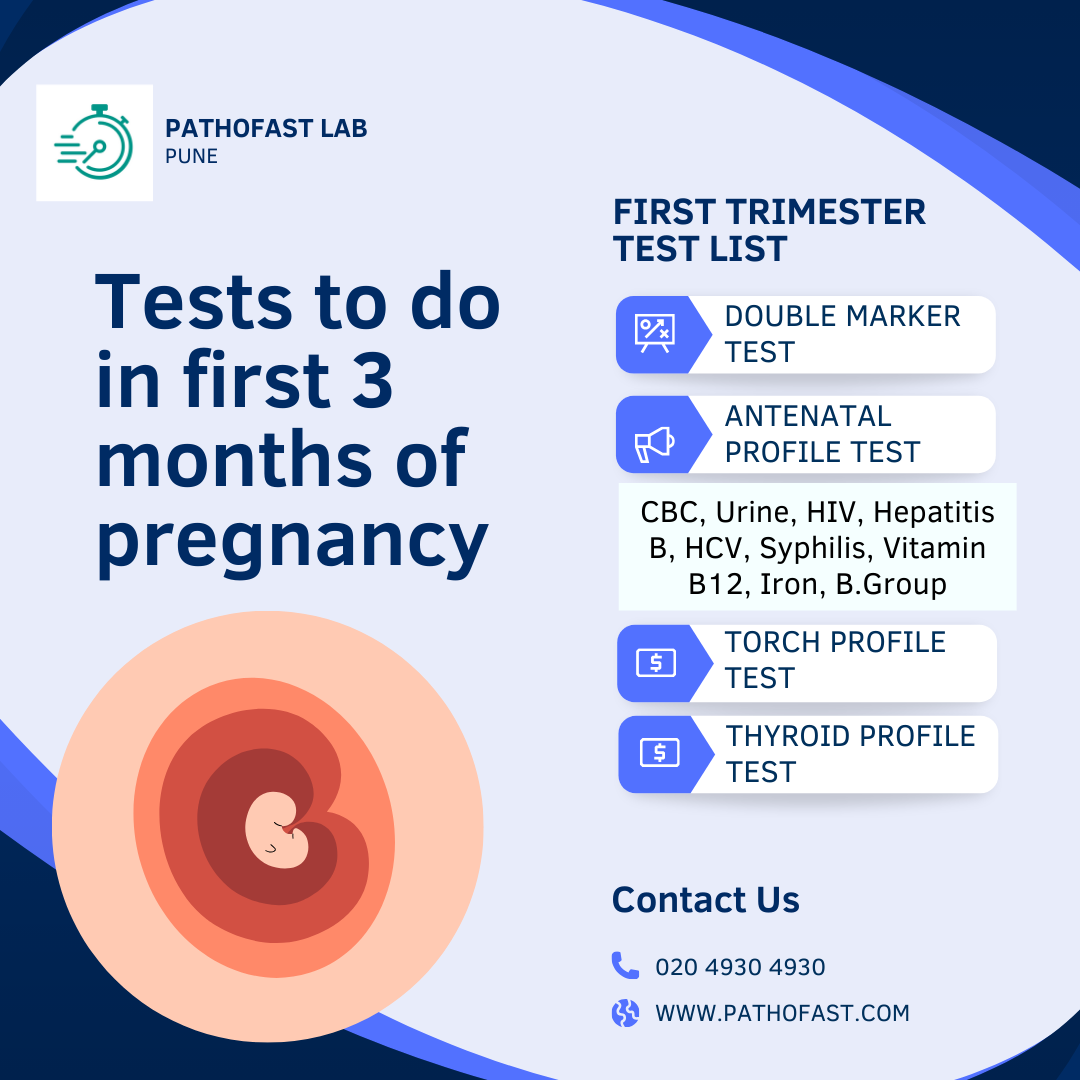
Mandatory tests in the first trimester
The second ANC profile and the Double Marker Test are mandatory to be done for safety of mother and child.Optional Tests in first trimester
TORCH Test and Thalessemia Screening Test (Hemoglobin Electrophoresis) are optional and may be advised by your obstetrician depending on other clinical factors.Double Marker Test / Dual Marker
Also known as Dual Marker or First Trimester Screen, this test is a blood test that is done around week 11-14 to check for genetic abnormalities in the developing fetus. It screens for Trisomy 18,21 (Down's Syndrome). It measures levels of PPAP-A and Free-Beta HCG, and uses a statistical calculation to determine how likely the fetus is, to carry some genetic abnormalities. For this test a USG report is also required, as well as the weight of the mother and whether she is a smoker.TORCH Test
Some doctors advise getting tested for the TORCH group of infections - Toxoplasma, Rubella, Cytomegalovirus, Herpes. These infections can be transmitted from mother to child. These infections must be detected as early as possible. If the fetus acquires these infections in the first trimester, an abortion may be required. This is a simple blood test. TORCH test is done as a screening test and avidity tests are done if any of the initial tests are positive.Second Antenatal Profile (ANC)
This profile is a group of 6-7 tests that are directed at evaluating the general health of the mother. These tests are to be done, at the beginning (first three months) and thereafter at every visit to the doctor. These tests include : CBC, Urine Routine, HIV, Hepatitis B, Syphilis, Blood Group Test, Vitamin B12 Test, Folate Test, Iron Test, Random Sugar Test. Of these, the Vitamin B12, Folate and Iron tests check for nutritional deficiencies in the mother. These can then be corrected immediately with supplements. The infections tested at this stage include HIV, Hepatitis B, Syphilis and at times, Hepatitis C. These are STD's that can be transmitted from mother to child and hence should be ruled out as early as possible. The other routine tests like CBC, and Urine Routine help rule out any general infection in the body. CBC Test is essential to know if the mother's hemoglobin is adequate. Some labs also include the Blood Group Test at this stage.Tests to be done between 3rd and 6th month of pregnancy (Second Trimester / Week 12 - 24)
The second trimester is the month 3-6 of pregnancy. During this period, the third ANC Profile and some additional genetic abnormality tests are to be done. Optionally the TORCH Tests can also be repeated.
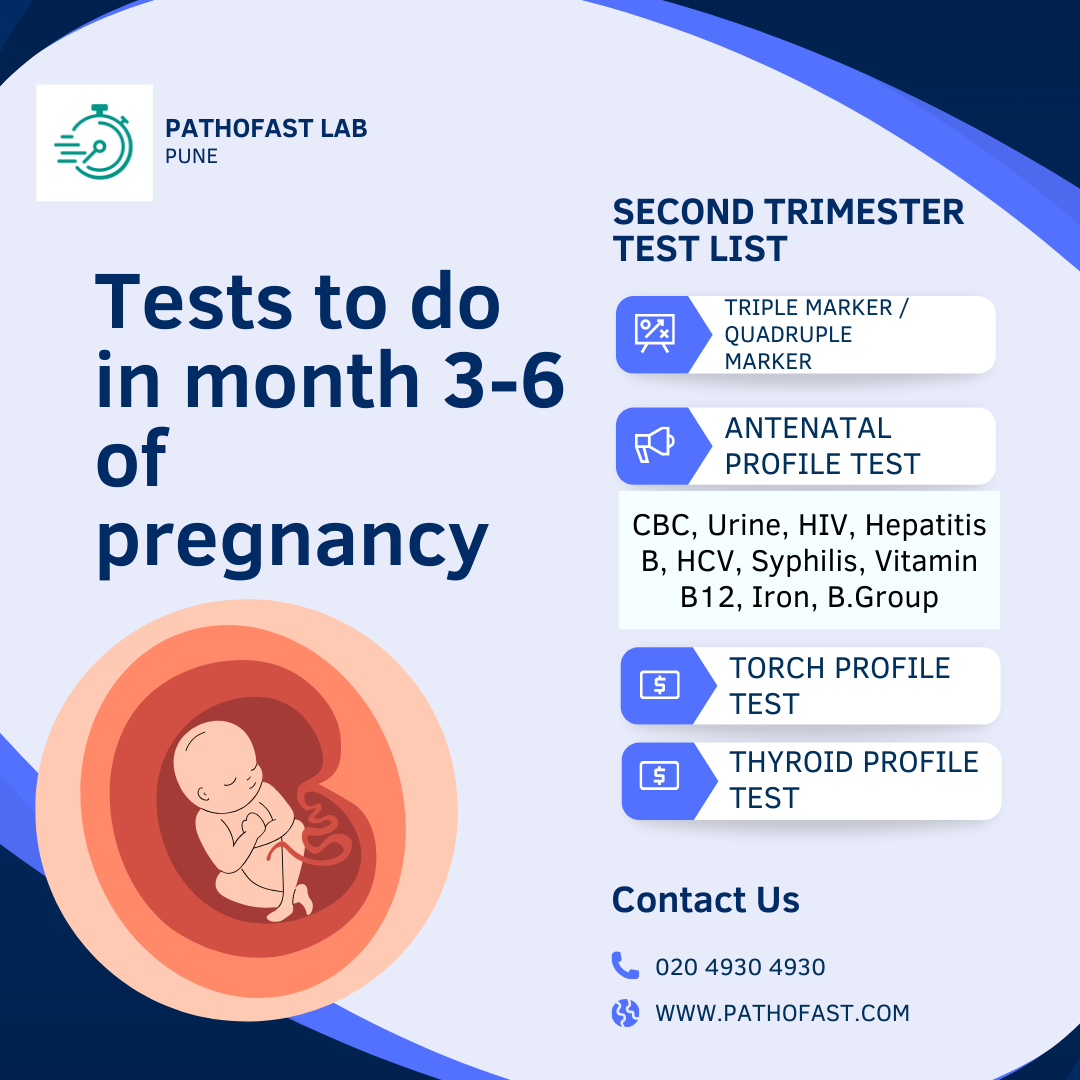
Mandatory tests in the third trimester
Either the triple marker test or the quadruple marker test is mandatory together with the ANC profile.Optional Tests in third trimester
TORCH Test and Thalessemia Screening Test (Hemoglobin Electrophoresis) are optional and may be advised by your obstetrician depending on other clinical factors.Triple Marker Test
triple marker Test: This test is performed to screen for chromosomal abnormalities and neural tube defects in the developing fetus. It measures levels of three substances: alpha-fetoprotein (AFP), human chorionic gonadotropin (hCG), and estriol. This test also needs a blood sample and a USG report.Quadruple Marker Test
quadruple marker Test: Similar to the triple marker Test, this test also screens for chromosomal abnormalities. It includes the same three markers as the triple marker Test, plus an additional marker called inhibin-A, which enhances the accuracy of the screening. This test also needs a blood sample and USG report.Third ANC Test
As described above, this involves repeating the ANC profile.Third trimester tests in pregnancy(Month 6 - month 9 / Week 24 onwards)
During the third trimester, a final ANC profile test should be done. Together with this, screening for diabetes in pregnancy should be done.
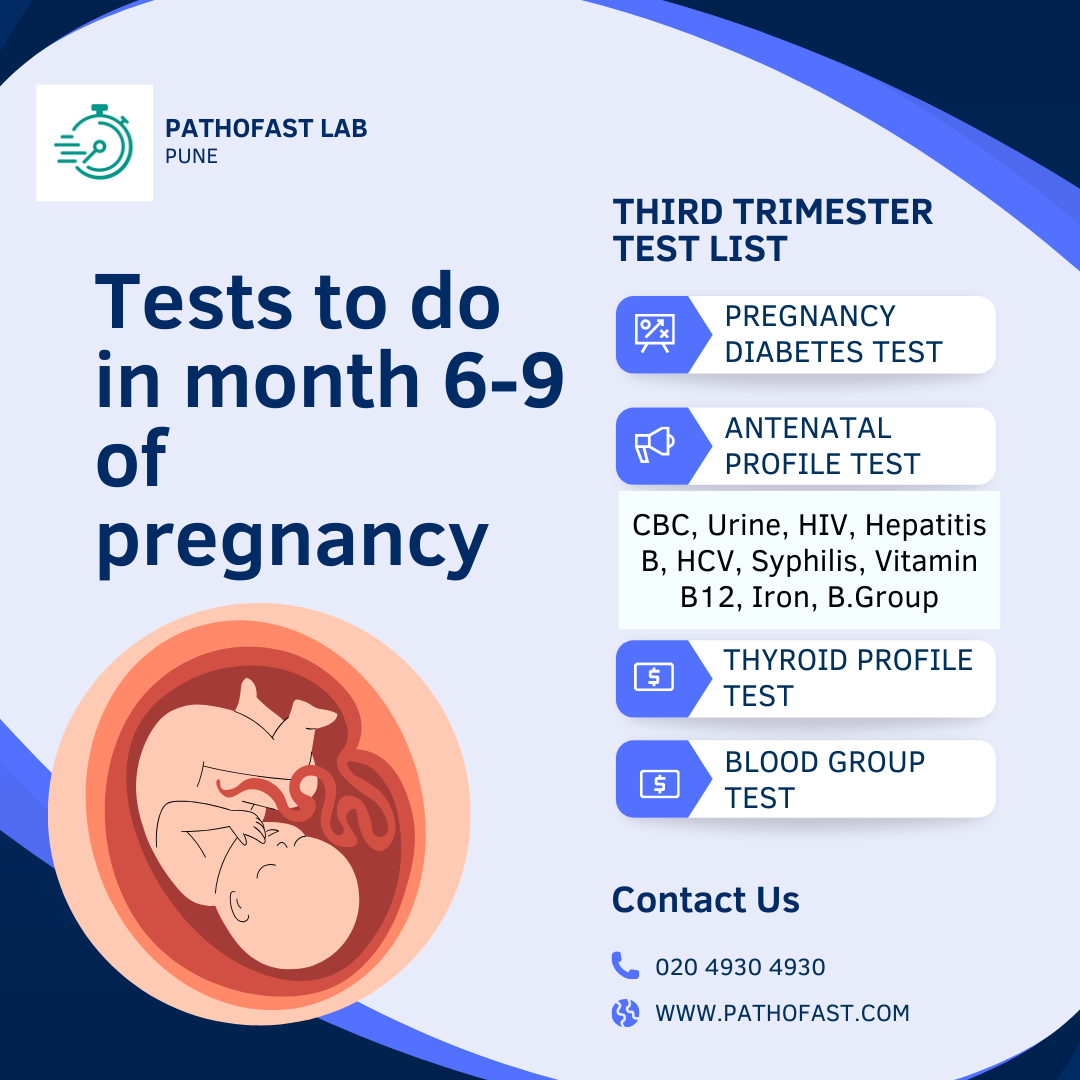
Mandatory Tests in the third trimester
Pregnancy Glucose Tolerance test should be done, together with the fourth ANC profile. Blood group test if not included in previous ANC profiles should be done.Tests for diabetes in pregnancy - Gestational Diabetes Mellitus
Gestational diabetes mellitus, commonly referred to as GDM, is a type of diabetes that develops during pregnancy and typically disappears after childbirth.It occurs because the placenta (connection between mother and baby) produces substances that cause insulin resistance. This means that the body is unable to metabolize sugar as it is prevented from using insulin effectively. GDM is typically diagnosed using a blood test called the Pregnancy Glucose Tolerance Test. It is done at week 24 of the pregnancy(or the beginning of the 6th month)
Pregnancy Glucose Tolerance Test
In this glucose tolerance test the patient is asked to fast for 8-12 hours. A single blood sample is collected. After this the patient is given a fixed amount of glucose solution. Subsequently blood samples are collected after 1 hour and again after 2 hours. The three values are plotted and GDM is diagnosed if any of the values are outside established ranges.Hormonal Changes:
During pregnancy, the placenta produces hormones that can lead to insulin resistance, making it more challenging for the body to use insulin effectively.Excessive Weight Gain:
Gaining too much weight during pregnancy can increase the risk of developing gestational diabetes, as it can interfere with the body’s ability to manage blood sugar levels.Family History:
A family history of diabetes, particularly in close relatives, can increase the likelihood of developing diabetes during pregnancy due to genetic predisposition.Glycosylated Hemoglobin (HbA1c)
: This test provides an average blood sugar level over the past 2-3 months. Elevated HbA1c levels indicate poor blood sugar control and can help diagnose diabetes during pregnancy. It’s a key marker for long-term glucose regulation, offering insight into the mother's overall diabetes management.Insulin Test
: These tests measure the amount of insulin in the blood. Insulin is a hormone that helps regulate blood sugar levels. Abnormal insulin levels can indicate insulin resistance or beta-cell dysfunction, which are common in gestational diabetes. Monitoring insulin levels helps in tailoring the treatment plan to ensure optimal health for both mother and baby.TORCH Test - Tests for Infections in Pregnancy
TORCH is a short form for Toxoplasma, Others, Rubella, Cytomegalovirus and Herpes
Each of these infections is important in pregnancy because it can be transmitted from mother to child, and can cause major abnormalities in the fetus, sometimes necessiating termination of pregnancy.
Why are TORCH Infections dangerous?
Infections from the TORCH group can cause abnormalities in the fetus like deafness, calcification of the brain and other abnormalities. They are most dangerous in the initial 20 weeks of pregnancy.Is TORCH Test mandatory?
While the TORCH test is not mandatory in all pregnancies, it should be done in mothers with a history of these infections.Thalessemia Screening in Pregnancy - Hemoglobin Electrophoresis Test
Hemoglobin Electrophoresis helps to detect abnormal hemoglobins in the mother. These can be passed to the child. Ideally Hemoglobin Screening should be done as a part of premarital screening tests, so that couples who are likely to produce children with abnormal hemoglobins can be appropriately counselled.
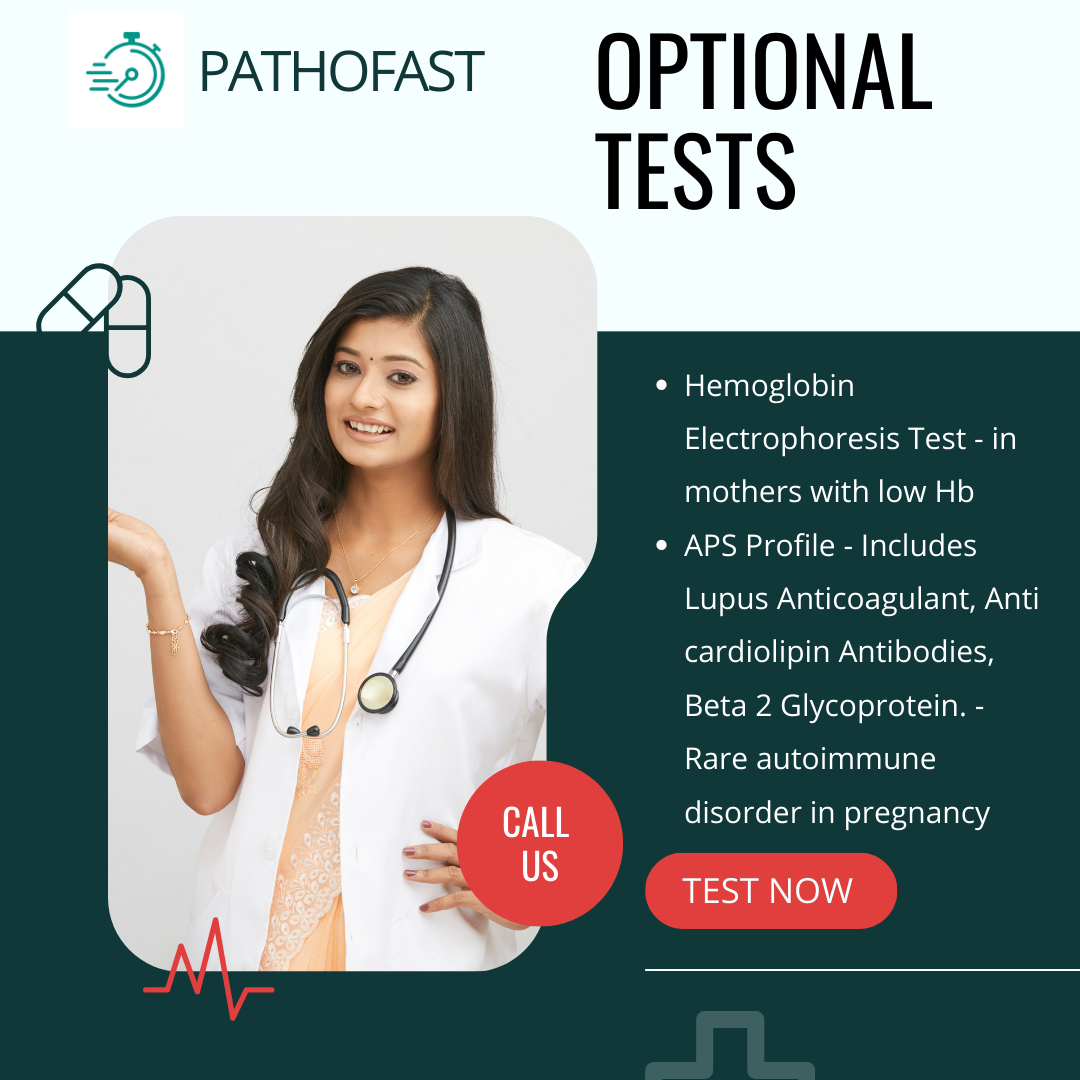
What does the Thalessemia/HB Screening Test show?
This test helps to identify abnormal hemoglobin in the mother. Examples of these include thalessemia, sickle cell disease and others. It is possible that the mother does not experience any symptoms as she has received one good copy of the hemoglobin from one of her parents. The Hemoglobin Electrophoresis test is a screening test to detect an abnormal hemoglobin in the mother.How is the abnormal hemoglobin transferred to the child?
If the child inherits one bad hemoglobin from the mother, and another weak hemoglobin from the father, he or she may suffer from the symptoms of the disease.NIPT - Non invasive pregnancy test : What is it and why is it important?
The Non-Invasive Prenatal Test (NIPT) is a cutting-edge screening method used during pregnancy to detect certain genetic conditions in the unborn baby.Unlike traditional invasive tests, NIPT analyzes small fragments of fetal DNA circulating in the mother's blood, making it a safer option for both the mother and the baby
Typically recommended for women at higher risk of chromosomal abnormalities, this test can be performed as early as the 10th week of pregnancy.With its high accuracy rate, NIPT offers expecting parents valuable insights into their baby's health without the risks associated with invasive procedures.
Testing for Dangerous Complications in Pregnancy
Some diseases like APS(Anti Phospholipid Syndrome) can produce complications during childbirth by causing clotting of blood in the mothers body.
APLA Profile
These tests screen for antibodies associated with the APS Syndrome. This is a rare autoimmune disease that causes serious blood clots in the mothers blood during childbirth. Tests for APS screening include : APLA IgM Antibodies, APLA IgG Antibodies, Anti Cardiolipin Antibodies Profile, Lupus Anticoagulant, and Beta-2-Glycoprotein Antibodies. The results of these tests need to be evaluated by an expert, before coming to any conclusions.Preparing for Blood Tests in Pregnancy
Most pregnancy blood tests do not require any special preparation. The only test which requires special preparation is the pregnancy glucose tolerance test for diabetes, before which the mother has to fast for 8-12 hours. The double, triple and quadruple marker tests require a USG report to be provided to the lab at the time of blood sample collection.
Finding a lab near you for Pregnancy Tests in Pune?
Pathofast Lab in Pune,Camp is centrally located and offers home sample collection services for Pregnancy Tests in Pune. Home pickup is available in various areas
What is the lab's address?
2nd Floor, Manisha Terrace, 411001, Moledina Rd, Camp, Pune, Maharashtra 411001How to find the nearest center for Pregnancy Tests in Pune?
Visit our center listed above or check the Center LocatorTable of locations in Pune for Pregnancy Tests with prices
The following table lists areas in Pune, where home sample collection is available for Pregnancy Tests. Prices charged for home visit are also listed, together with final rate for Pregnancy Tests in that area.| Area/Locality in Pune | Home Sample Facility | Transport Charges |
|---|---|---|
| Jangli Maharaj Nagar | Available | 100 INR |
| Ravet | Available | 200 INR |
| Viman Nagar | Available | 150 INR |
| Shastrinagar, Yerawada | Available | 100 INR |
| NIBM Undri Road, Kondhwa | Available | 100 INR |
| Camp | Available | 0 INR |
| Aundh | Available | 200 INR |
| Baner | Available | 200 INR |
| Dattwadi | Available | 200 INR |
| Undri | Available | 200 INR |
| Pimpri-Chinchwad | Available | 200 INR |
| Kalyani Nagar | Available | 50 INR |
| Koregaon Park | Available | 50 INR |
| Sadashiv Peth | Available | 100 INR |
Further Reading
The following is a list of references with more information about pregnancy testing
Pathofast Lab Pune
Table of Contents
- What is Pregnancy - What are the different pregnancy tests?
- Lab tests to know if you are pregnant
- Tests to be done in first three months of pregnancy(first trimester / week 1 - 12)
- Tests to be done between 3rd and 6th month of pregnancy (Second Trimester / Week 12 - 24)
- Third trimester tests in pregnancy(Month 6 - month 9 / Week 24 onwards)
- Tests for diabetes in pregnancy - Gestational Diabetes Mellitus
- TORCH Test - Tests for Infections in Pregnancy
- Thalessemia Screening in Pregnancy - Hemoglobin Electrophoresis Test
- NIPT - Non invasive pregnancy test : What is it and why is it important?
- Testing for Dangerous Complications in Pregnancy
- Preparing for Blood Tests in Pregnancy
- Finding a lab near you for Pregnancy Tests in Pune?
- Further Reading
